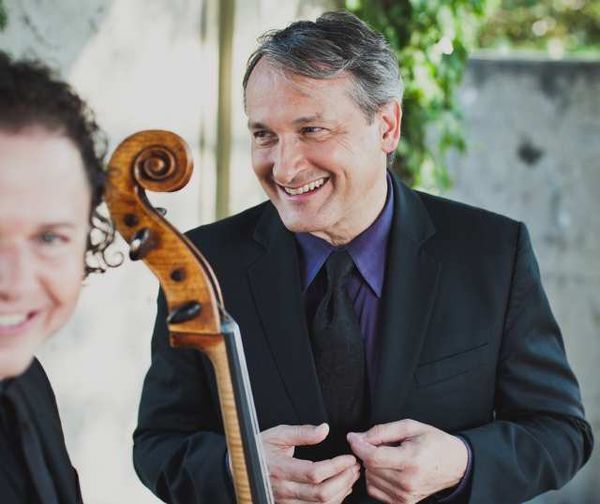Christopher O’Riley, host of NPR’s From the Top, has recorded several albums of solo piano, including collections of music written by Radiohead and Nick Drake. His latest album, Shuffle. Play. Listen., a collaboration with cellist Matt Haimovitz, is a wide-ranging collection, encompassing everything from Stravinsky’s Suite Italienne to Blonde Redhead’s “Misery Is a Butterfly.” He’s also composed music to accompany a sequence of Anton Chekhov short stories, and — as I’ve learned — may have a collaboration with Mark Z. Danielewski on the horizon. I checked in with O’Riley recently to learn more about this and some of his other recent projects.
What leads you to the pieces that you’ve chosen to play and record? Is the process of discovering a new song to arrange for piano similar to finding a composition to perform?
It’s rare that I’m drawn to working on a body or work, as I have been with the intensely contrapuntal and multi-layered production style of Radiohead or Elliott Smith. Most times, I’m just drawn obsessively towards a song or what i perceive as a way to make the song reworked on piano in a way that i think enhances the song: I did Tori Amos’ ‘Mother’ as it popped up on my iPod prior to a Mother’s Day taping of my NPR radio program, From the Top. I was moved to make a diptych of George Harrison songs, choosing from his drone/raga songs to make a memorial of “Within You and Without You” & “Blue Jay Way.” Similar elegiac feelings prompted my take on Rick Wright’s song for Pink Floyd, “Us & Them.” The dark esthetic of grunge led me to do a synesthete’s take on Black as the riot of all colors instead of its mere absence in my “Heart-Shaped Box” arrangement of the Nirvana song.
It is similar to the idea of Classical repertoire as that which one reads through cursorily until one finds a spark, a kindred spirit, a compelling landscape. A song takes you and doesn’t let go til you’ve listened to it 700 times, and 500 times into it come up with a concept of how it might work on piano.
The title of Shuffle. Play. Listen. suggests randomness — yet listening to the album, there is a definite progression. Was that intentional, or do you think that the mind of the listener can create an arc out of a variety of permutations?
We invite listeners to take the album title as instruction. Matt and I have always been believers in the power of context as well as text in recital programming, but we’re keen on listeners relishing the contrast and commonality radiating within and between the works that make up the 2 discs.
However, most of us still like listening to what an artist has comprised to be a disc’s worth of music, and thereby one is pleasurably challenged to make a sequence that pleases. Matt’s brainstorm was to take my Vertigo movements and use them interstitially, pre-shuffled, as palate-cleansers between the larger-format Classical works on Disc One. The Pop Disc (Two) presented wonderful difficulties, which I feel Matt and Producer Luna Pearl Wolff met admirably.
You’ve been involved in events that have paired music with the stories of Anton Chekhov. Do you have any plans to revisit this blend of literature and music in the future?
Was recently asked to contribute an original work in response to a recently released novel by Kris Saknussemm entitled Reverend America. A CD of compositions accompanied the release of the book (also available as a free live mp3 on christopheroriley.com). I am blessed to have writers for friends (probably more so than other musicians). It’s very likely I’ll be contributing new work to accompany the release of Mark Z. Danielewski’s The Fifty-Year Sword in October.
What have you been reading lately?
Most importantly, i’ve just finished reading The Exegis of Philip K. Dick (a truly sacred text), and made a new discovery in the brilliant Lucius Shepard, thanks in part to another fantastic American writer, Stona Fitch, whose Concord Free Press recently released a later effort of Shepard, A Handbook of American Prayer.
Also, anything that i haven’t already read of Roberto Bolano, most recently the collection of short material, The Secret of Evil.
Do you find that your choices of reading also have an influence on the music that you perform?
It’s an interesting thought, but my reading usually has a different trajectory than anything i might be playing. There are few writers (Kris and Mark among them) who have truly encyclopedic grasp of music (PKD was happily another) such as to make it part of their fictional rhetoric. But it’s very exciting when that confluence occurs. If I were more of a blues guy, I would probably do the first Andrew Vachss opera.
Follow Vol. 1 Brooklyn on Twitter, Facebook, Google + and our Tumblr.

